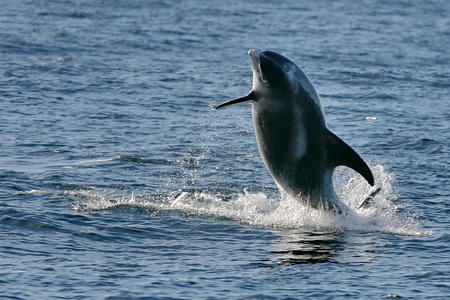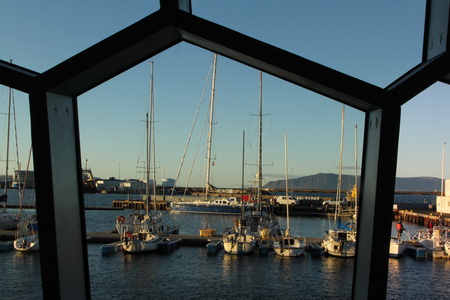As the Song of the Whale research draws to a close, a change is certainly afoot in the weather off Iceland. As we leave Faxaflói Bay behind us and head offshore, the calm summer conditions of recent weeks seem like a distant memory as we brace ourselves for a first dose of winter weather. Unfortunately, the rough conditions compromise our research effectiveness, as we are now almost entirely reliant on our acoustic capability. Although we hear sperm whales and dolphins, we see very little. At least the high winds and swell give our Icelandic volunteers Arnar Bjornsson and Johan Porbjornsson a taste of life on the high seas! The winter storms continue to roll in from the USA over our final two weeks in Iceland limiting our work to shorter trips in Faxaflói Bay. Although we had intended to retrieve the EAR (Ecological Acoustic Recorder) that had been deployed with the University of Iceland earlier in the season, this is now considered impossible as the retrieval process requires conditions calm enough to spot the sea-bed recorder after it is freed and floats to the surface.

The poor weather allows us to encourage local people to come aboard Song of the Whale in harbour. Open days in both Reykjavik and Keflavik are well attended, particularly by exuberant school groups. We are also able to take David Martin, a visiting Scottish MEP, out for a short trip in Faxaflói Bay. Although the weather is far from perfect, we are keen to show David our research techniques in person as he is helping IFAW in their campaign to end commercial whaling. Our season wraps up with an event in HARPA, the state-of-the-art concert hall overlooking the harbour. Not just a chance to summarise the work of the Song of the Whale team in Iceland, this is also an opportunity for Robbie Marsland, director of IFAW’s UK office, to review the successes of IFAW’s ‘Meet Us Don’t Eat Us’ campaign. At the reception, the Environment Minister expresses her support for a call to make the whole of Faxaflói Bay a whale sanctuary. The sanctuary could effectively end minke whaling in Iceland and we are pleased to hear the Dean of the Science Faculty of the University of Iceland and the chairman of the Icelandic Tourism Association also support the sanctuary. Thus it is that as our new team members Miriam, Solve and Smiley join Brian, Matt and Milaja in preparing Song of the Whale for the return passage to the UK, we are left feeling positive about the future for whales in Icelandic waters.

Sorry, comments are closed for this post.